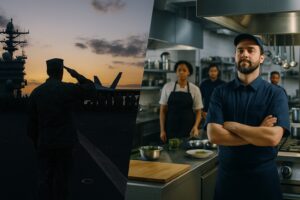
Each Veterans Day, we pause to honor the men and women who have served our nation. At Foodservice IP, we also recognize how deeply veterans continue to shape the foodservice industry — from the front lines of restaurant operations to leadership roles in manufacturing, distribution, and innovation. Their influence can be seen not only in the way foodservice companies run but also in how they lead with purpose, resilience, and teamwork.
1. Leadership and Values
Veterans bring mission-first thinking, accountability, and the ability to lead under pressure — qualities that translate seamlessly into foodservice. A 2024 U.S. Chamber of Commerce report found that 76% of employers rate veterans as stronger-than-average leaders. It’s no surprise that many franchise operators, plant managers, and corporate leaders trace their success to military service. For example, Arby’s and Chick-fil-A have both highlighted veteran franchisees whose teams demonstrate exceptional consistency and morale — traits honed through years of disciplined service.
2. Career Transitions
Transitioning from the military to civilian life isn’t easy, but the foodservice industry offers structure and purpose that resonate with veterans. Programs like Hiring Our Heroes and Restaurant Ready (from the National Restaurant Association Educational Foundation) help veterans translate military skills into management, logistics, and culinary roles. Yet more can be done — many veterans still struggle with job placement due to mismatched titles or limited awareness of career pathways in foodservice operations.
3. Cultural Impact
Veterans strengthen workplace culture through teamwork and shared mission. They model the calm and focus that keep kitchens, warehouses, and offices running smoothly during peak hours. As one Navy veteran turned distributor sales manager put it, “The difference between a lunch rush and a logistics operation isn’t as big as you’d think — both require trust and timing.” Their presence creates accountability and mentorship that lift entire teams.
4. Innovation and Adaptability
Foodservice is about constant change — and few people adapt better than veterans. Their training prepares them to make quick, informed decisions and handle uncertainty with composure. Veteran leaders are often early adopters of technology, process improvements, and sustainability initiatives. For instance, several military-affiliated franchise groups have piloted automation tools and waste-reduction systems that improve both speed and consistency.
5. Support and Recognition
While progress has been made, the industry can do more to recruit and retain veterans. According to the National Restaurant Association, veterans make up nearly 10% of the restaurant workforce — but few companies have dedicated veteran resource groups or leadership pipelines. Initiatives like Starbucks’ Veteran and Military Family Store model and Sysco’s Operation Open Doors provide a roadmap for how recognition can translate into meaningful opportunity.
6. Personal Stories
Behind every statistic is a story of service, resilience, and reinvention. Whether it’s a former Marine leading a commissary kitchen, an Army veteran managing a national distribution center, or a Navy cook mentoring young culinary apprentices — each brings lessons that go far beyond food.
On this Veterans Day, we honor those who served — and continue to serve through leadership, teamwork, and integrity. The foodservice industry is stronger because of you.
From all of us at Foodservice IP, thank you for your service — and for inspiring an industry grounded in care, excellence, and shared purpose.
Recent Comments